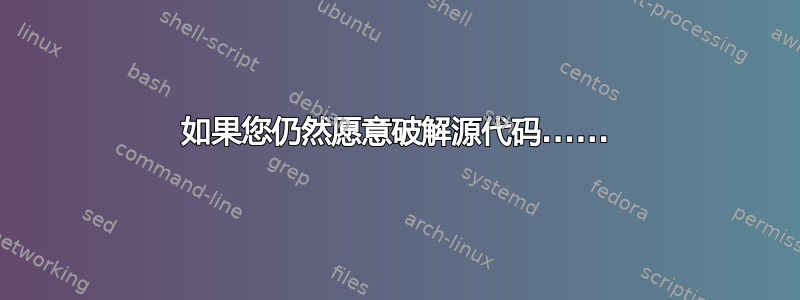
在 Vim 中,您可以点击Shift-k并打开光标下字符串的手册。
是否也可以以这种方式配置 Bash(使用时set -o vi)?
例如:
# '|' represents the position of a cursor.
$ |
# Write a command.
$ grep things *|
# Hit 'esc' to enter normal mode.
# Hit '3b' to move to 'grep'.
$ |grep things *
# Now I would like to hit 'Shift-k' to open 'man grep'.
答案1
您可以将 bash 函数绑定到一个键bind -x。在此函数中,您可以通过变量访问输入缓冲区的当前内容READLINE_LINE和READLINE_POINT。
run_man () {
declare prefix="${READLINE_LINE:0:$READLINE_POINT}" suffix="${READLINE_LINE:$READLINE_POINT}"
declare word="${prefix##*[!-+.0-9A-Z_a-z]}${suffix%%[!-+.0-9A-Z_a-z]*}"
man "$word"
}
bind -m vi -x '"K": run_man'
打开命令位置单词的手册页可能比打开光标下单词的手册页更有用,但这需要更复杂的解析。 bash 完成代码可能会有所帮助。或者您可能会选择该行的第一个单词,这比获取当前单词需要更少的解析。
要检测 bash 内置函数并显示 bash 文档而不是手册页,请参阅通用 help/man 命令:帮助内置部分匹配
聚苯乙烯
如果能够看到 man 而无需从提示符中删除整个命令,那就太好了。
我经常在 zsh 中这样做。我希望在 bash 中也可以,但设置起来更复杂。
答案2
只需使用历史扩展引用最后给出的命令的命令名称。
$ grep something
$ man !:0
由于历史扩展已完成前别名扩展,如果你想使用别名,你应该这样做:
alias k='man "$(history -p \!:0)"'
然后只需键入k即可查看最后执行的命令的手册页。
答案3
太长了;博士
这不是标准操作,但您可以很容易地添加它。看这个答案(链接)。
如果您仍然愿意破解源代码......
我读了的源代码readline看起来添加所需的功能是相当可行的。readline已经支持v允许您进入编辑模式并打开$EDITOR.如果分析如何readline打开的逻辑,那么用光标下的单词作为参数$EDITOR打开应该很容易。man
这里有一些有趣的 grep:
grep -RI EDITOR *doc/hsuser.texi:is used: @code{$@{FCEDIT:-$@{EDITOR:-vi@}@}}. This says to use the doc/hsuser.texi:@env{EDITOR} variable if that is set, or @code{vi} if neither is set. doc/rluser.texi:@code{$VISUAL}, @code{$EDITOR}, and @code{emacs} examples/rlfe/ChangeLog: * line options; use EDITOR/VISUAL to set vi/emacs preference. examples/rlfe/README:but if the the environment variable EDITOR is set to "vi" that examples/rlfe/rlfe.c: * line options; use EDITOR/VISUAL to set vi/emacs preference. examples/rlfe/rlfe.c: if (getenv ("EDITOR") != 0) examples/rlfe/rlfe.c: vi |= strcmp (getenv ("EDITOR"), "vi") == 0;grep -RI -C 5 editing-mode *.cbind.c- { "bell-style", V_STRING, sv_bell_style }, bind.c- { "comment-begin", V_STRING, sv_combegin }, bind.c- { "completion-display-width", V_INT, sv_compwidth }, bind.c- { "completion-prefix-display-length", V_INT, sv_dispprefix }, bind.c- { "completion-query-items", V_INT, sv_compquery }, bind.c: { "editing-mode", V_STRING, sv_editmode }, bind.c- { "emacs-mode-string", V_STRING, sv_emacs_modestr }, bind.c- { "history-size", V_INT, sv_histsize }, bind.c- { "isearch-terminators", V_STRING, sv_isrchterm }, bind.c- { "keymap", V_STRING, sv_keymap }, bind.c- { "keyseq-timeout", V_INT, sv_seqtimeout }, -- -- bind.c- else if (_rl_stricmp (name, "completion-query-items") == 0) bind.c- { bind.c- sprintf (numbuf, "%d", rl_completion_query_items); bind.c- return (numbuf); bind.c- } bind.c: else if (_rl_stricmp (name, "editing-mode") == 0) bind.c- return (rl_get_keymap_name_from_edit_mode ()); bind.c- else if (_rl_stricmp (name, "history-size") == 0) bind.c- { bind.c- sprintf (numbuf, "%d", history_is_stifled() ? history_max_entries : 0); bind.c- return (numbuf); -- -- funmap.c- { "do-lowercase-version", rl_do_lowercase_version }, funmap.c- { "downcase-word", rl_downcase_word }, funmap.c- { "dump-functions", rl_dump_functions }, funmap.c- { "dump-macros", rl_dump_macros }, funmap.c- { "dump-variables", rl_dump_variables }, funmap.c: { "emacs-editing-mode", rl_emacs_editing_mode }, funmap.c- { "end-kbd-macro", rl_end_kbd_macro }, funmap.c- { "end-of-history", rl_end_of_history }, funmap.c- { "end-of-line", rl_end_of_line }, funmap.c- { "exchange-point-and-mark", rl_exchange_point_and_mark }, funmap.c- { "forward-backward-delete-char", rl_rubout_or_delete }, -- -- funmap.c- { "vi-column", rl_vi_column }, funmap.c- { "vi-complete", rl_vi_complete }, funmap.c- { "vi-delete", rl_vi_delete }, funmap.c- { "vi-delete-to", rl_vi_delete_to }, funmap.c- { "vi-eWord", rl_vi_eWord }, funmap.c: { "vi-editing-mode", rl_vi_editing_mode }, funmap.c- { "vi-end-bigword", rl_vi_eWord }, funmap.c- { "vi-end-word", rl_vi_end_word }, funmap.c- { "vi-eof-maybe", rl_vi_eof_maybe }, funmap.c- { "vi-eword", rl_vi_eword }, funmap.c- { "vi-fWord", rl_vi_fWord },


